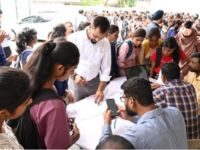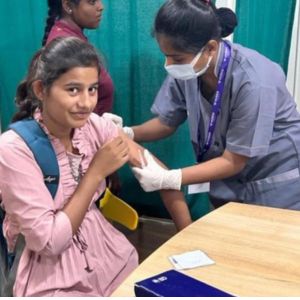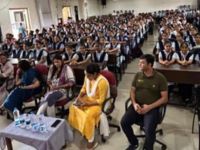Swasthya Vriksha Foundation through the Cancer Kavach initiative pledges to safeguard women’s health in India by reducing the incidence of cervical cancer. We aim to spread awareness and make the HPV vaccines available free of cost to underprivileged girl beneficiaries between the age of 9-20 years.

INTRODUCTION
Human Papillomavirus (HPV) is the most common sexually transmitted infectionin the world. Cervical cancer is a public health problem in developing countries like India, so much so that India alone accounts for one-quarter of the worldwide burden of cervical cancers. It is one of the leading cause of cancer mortality, accounting for 17% of all cancer deaths among women aged between 30 and 69 years. It is estimated that cervical cancer will occur in approximately 1 in 53 Indian women during their lifetime. Cervical cancer ranks as the 2nd most frequent cancer among women in India. Fortunately, the HPV vaccine has emerged as a powerful tool in preventing these risks.
HPV VACCINE
- The HPV vaccine protects against genital warts and most cases of cervical cancer. It protects against cancer of the vagina, vulva, penis, or anus caused by HPV.
- The HPV vaccine also protects against mouth, throat, head, and neck cancers caused by HPV.
- It typically acts against a handful of viral types.
- The vaccines are largely inaccessible due to their high cost and are not included in India’s Universal Immunization Program, through which children and pregnant women get free vaccines.

WHO RECOMMENDATIONS
A one or two-dose schedule for girls aged 9-14 years. A one or two-dose schedule for girls and women aged 15-20 years. Two doses with a 6-month interval for women older than 21 years.
ADVANTAGES OF THE HPV VACCINE
- High Efficacy: Clinical trials have demonstrated the vaccine’s effectiveness in preventing HPV infection and related cancers. It provides robust protection against the most common cancer-causing HPV strains
- Long-lasting Immunity: The vaccine offers long-lasting protection. It is typically administered as a series of shots over several months, ensuring immunity for years, if not a lifetime.
- Prevention at a Young Age: The vaccine is recommended for young individuals, ideally before they become sexually active. This early intervention is vital in preventing HPV infections that can lead to cancer later in life.
- Herd Immunity: Widespread HPV vaccination can contribute to herd immunity, indirectly protecting unvaccinated individuals by reducing the prevalence of the virus in the population.

CONTRAINDICATIONS
- The HPV vaccine is not given during pregnancy.
- The HPV vaccine is not recommended if a person had an allergic reaction after the first HPV shot, or if a person has severe, life-threatening allergies.
- People who are moderately or severely ill should wait until they feel better to get vaccinated for HPV.

COLLABORATE AND CONTRIBUTE
We invite people, communities, government authorities, corporate houses and NGOs to collaborate and contribute in the form of donations / CSR funding to eradicate cervical cancer in India. Let’s together ight against this alarming and life- threatening disease which can easily be prevented if addressed at an early stage.